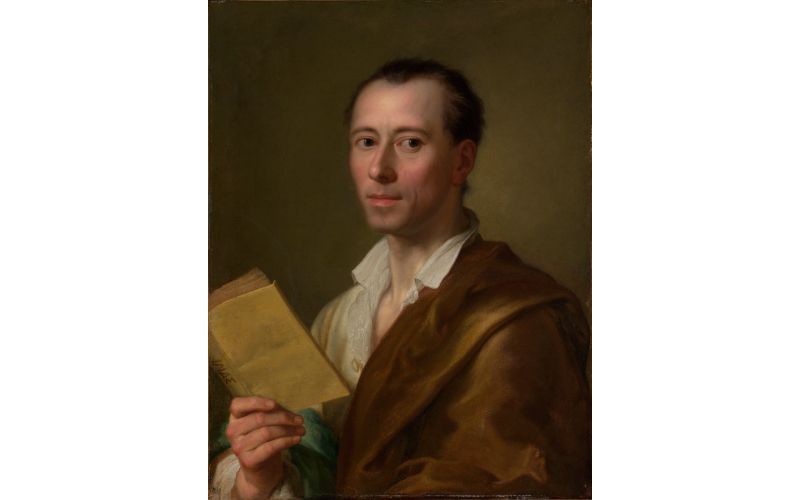100 Heroes: Johann Joachim Winckelmann
The gay man who helped establish the discipline of archaeology.

Johann Joachim Winckelmann was an art historian and archaeologist.
He was a pioneering Hellenist who first articulated the difference between Greek, Greco-Roman and Roman art.
Winckelmann was one of the founders of scientific archaeology and first applied the categories of style on a large, systematic basis to the history of art. Many consider him the father of the discipline of art history. He was one of the first to separate Greek Art into periods, and time classifications.
His writings influenced not only a new science of archaeology and art history but also painting, sculpture, literature, and philosophy.
Early life and career
Born in 1717, Winckelmann was in the Margraviate of Brandenburg. At the time, this part of the world was part of the Holy Roman Empire. Today it falls within the borders of Germany.
After initially studying medicine, it was Winckelmann's noted enthusiasm for the male form that fuelled his passion for ancient Greek and Roman sculpture.
In 1755, Winckelmann published Thoughts on the Imitation of Greek Works in Painting and Sculpture. The book established Winckelmann as a writer of note.
Sexuality
Winckelmann was very into men. His writings on aesthetics extensively featured homoeroticism.
Death
In 1768 - as he travelled from Vienna to Rome - Winckelmann was murdered in Trieste.
He was killed in a hotel bed by a fellow traveller, a man named Francesco Arcangeli. Arcangeli was executed a month later.
While we don't know precisely what Arcangeli's motivations were, we do know a bit about the circumstances of what went down in Trieste.
In 1768, Winckelmann was aged 51 and he was at the height of his fame. The journey he was making from Vienna to Rome was following an audience with Maria Theresa of Austria - she ruled the Austro-Hungarian empire at that time, she was one of the world's richest and most powerful people. According to contemporary reports, Winckelmann had been "richly decorated" by Maria Theresa.
Winckelmann arrived in Trieste on 1st June 1768. He checked into his accommodation - a local inn - to wait for the departure of the ship on which he was planning to sale to Rome. Winkelmann checked in under an assumed name - he was that famous that he was trying to travel incognito.
Francesco Arcangeli was staying in the inn - he occupied the neighbouring room to Winkelmann.
Arcangeli was 31 years old - he was described by the authorities as an unemployed cook and a petty criminal.
The authorities that investigated the murder documented that Winkelmann and Arcangeli spent a lot of time together - they dined together each night and were noted to spent long hours together. Arcangeli was apparently fascinated by the historian, who shared with him tales of his adventures and illustrious friends.
The murder happened on 7th June, so Winkelmann and Arcangeli had six or seven days together in Trieste.
On the 7th of June, it's reported that Arcangeli strangled Winkelmann with a rope and then stabbed him multiple times. It seems that the attack happened in Winkelmann's room at the inn. Arcangeli fled the scene. Winckelmann survived for a few hours before dying from his injuries. It's recorded by the authorities that before his death, Winckelmann said that he forgave Arcangeli.
Arcangeli was arrested soon after the attack. He was interrogated and he gave a range of reasons for the murder - including robbery but also a suggestion of political intrigue.
Sentenced to death, Arcangeli was executed in front of the inn where he had killed Winckelmann.
The general assumption by scholars and historians is that Winckelmann and Arcangeli were lovers, but the precise nature of their connection is difficult to understand.
Arcangeli seems to have been too old to have been a local rent-boy that Winckelmann engaged on a whim. He also doesn't seem sophisticated enough to be some sort of assassin or foreign agent despatched to remove Winckelmann from whatever political intrigues he might have got himself involved in.
It is possible that the two men knew each other before Winckelmann arrived in Trieste but they were clearly from such different social worlds that it's hard to imagine what might have brought them together. Sure, maybe it was just sex, but they spent a lot of time together.
Also, the fact that Winkelmann said that he forgave Arcangeli seems to suggest that Winkelmann had some understanding of Arcangeli's motivations.
We can speculate but we'll never know.